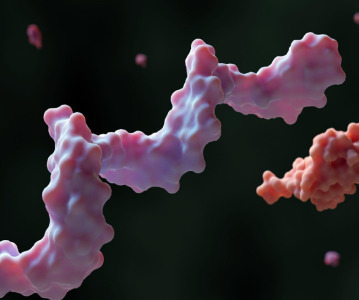Freshly mapped enzyme may help drug development

New enzyme-mapping advance could help drug development.
Scientists at MIT and the University of São Paulo in Brazil have identified the structure of an enzyme that could be a good target for drugs combatting three diseases common in the developing world.
The enzyme, fumarate hydratase (FH) is essential for metabolic processes of parasites that are responsible for the spread of three diseases: Leishmaniases, Chagas disease, and sleeping sickness. As such, understanding the enzyme’s structure could help researchers figure out how to inhibit FH enzymes, thereby providing new medical therapies.
“This enzyme is really critical for the metabolism of organisms like Leishmania major,” says Catherine Drennan, an MIT professor whose lab hosted the research. “If you knock it out, the organism should be dead.”
Leishmaniases are a group of diseases varying from severe skin ulcers to debilitation of internal organs, and are present in Asia, Africa, the Americas, and Southern Europe. Chagas disease, located mostly in Latin America, causes cardiac and intestinal complications, and can lead to heart failure. Sleeping sickness affects humans and other animals and is an often-deadly disease concentrated in Africa.
The study of FH began at the University of São Paulo, where researchers Patricia R. Feliciano and M. Cristina Nonato made important progress on studying Leishmania major FH. Feliciano then moved to MIT to complete the analysis of the enzyme structure with Drennan, a professor of chemistry and biology, and an investigator with the Howard Hughes Medical Institute.
“The exciting thing about this is thinking that my work could help people who have those diseases,” says Feliciano.
The paper, “Crystal structure of an Fe-S cluster-containing fumarate hydratase enzyme from Leishmania major reveals a unique protein fold,” is being published today in Proceedings of the National Academy of Sciences (PNAS). The authors are Feliciano, Drennan, and Nonato.
First in class
Fumarate hydratase enzymes fall into two types, class I and class II. The current study represents the first time that a class I fumarate hydratase enzyme has been mapped.
Significantly, the Leishmania major FH enzyme has a protein architecture — it vaguely resembles a human heart in appearance — that is distinctive from the structure of human fumurate hydratase.
“When we looked at the structure for the first time, it was like, ‘Whoa, it is completely different from the human FH enzyme,’” says Feliciano.
“The fact that it is a novel fold does add to the idea that this is a good drug target,” Drennan adds. “It has a lot of potential.”
Here’s why: The distinctive structure of class I FH makes it possible that drugs could target the parasite variant of the enzyme alone, while leaving intact the functionally equivalent enzymes that humans use.
“It’s an enzyme that does the exact same thing, but it’s a completely different enzyme,” Drennan explains. “That’s what makes this such an exciting target.”
Brazil connection
The finding stems from work Feliciano started doing nine years ago in Brazil in Nonato’s lab, but was not able to complete at the time, in part because of difficulties accessing the right equipment.
In 2012 Feliciano arrived at MIT, where the Drennan Lab has tools that let researchers form crystals of proteins under anaerobic (oxygen-free) conditions. Having formed a crystal of the Leishmania major FH enzyme, it still took Feliciano several months to completely map out the enzyme’s structure, partly because of its complexity, she notes.
Drennan emphasizes the complementary aspects of the research arrangement, with the research problem identified and important groundwork accomplished in Brazil, while MIT provided the right tools to solve the enzyme structure, and with the results hopefully having long-term application in Latin America and Africa.
“It’s a really lovely collaboration between the two groups and two countries,” Drennan says.
For that matter, Drennan says, the nature of globalization means diseases can spread worldwide in relatively short timespans these days. That means the need to find remedies for Leishmaniases, Chagas disease, and sleeping sickness is potentially global, too.
“I think it’s important to reflect on these health issues, and more people in the US need to be aware of these diseases,” Drennan says. “The world is getting to be a smaller place.”
Related News
-
News Google-backed start-up raises US$600 million to support AI drug discovery and design
London-based Isomorphic Labs, an AI-driven drug design and development start-up backed by Google’s AI research lab DeepMind, has raised US$600 million in its first external funding round by Thrive Capital. The funding will provide further power t... -
News AstraZeneca to invest US$2.5 billion in Beijing R&D centre
Amid investigations of former AstraZeneca China head Leon Wang in 2024, AstraZeneca have outlined plans to establish its sixth global strategic R&D centre in China. Their aim is to further advance life sciences in China with major research and manufact... -
News Experimental drug for managing aortic valve stenosis shows promise
The new small molecule drug ataciguat is garnering attention for its potential to manage aortic valve stenosis, which may prevent the need for surgery and significantly improve patient experience. -
News How GLP-1 agonists are reshaping drug delivery innovations
GLP-1 agonist drug products like Ozempic, Wegovy, and Mounjaro have taken the healthcare industry by storm in recent years. Originally conceived as treatment for Type 2 diabetes, the weight-loss effects of these products have taken on unprecedented int... -
News A Day in the Life of a Start-Up Founder and CEO
At CPHI we work to support Start-Up companies in the pharmaceutical industry and recognise the expertise and innovative angles they bring to the field. Through our Start-Up Programme we have gotten to know some of these leaders, and in this Day in the ... -
News Biopharmaceutical manufacturing boost part of new UK government budget
In their national budget announced by the UK Labour Party, biopharmaceutical production and manufacturing are set to receive a significant boost in capital grants through the Life Sciences Innovative Manufacturing Fund (LSIMF). -
News CPHI Podcast Series: The power of proteins in antibody drug development
In the latest episode of the CPHI Podcast Series, Lucy Chard is joined by Thomas Cornell from Abzena to discuss protein engineering for drug design and development. -
News Amgen sues Samsung biologics unit over biosimilar for bone disease
Samsung Bioepis, the biologics unit of Samsung, has been issued a lawsuit brought forth by Amgen over proposed biosimilars of Amgen’s bone drugs Prolia and Xgeva.
Recently Visited
Position your company at the heart of the global Pharma industry with a CPHI Online membership
-
Your products and solutions visible to thousands of visitors within the largest Pharma marketplace
-
Generate high-quality, engaged leads for your business, all year round
-
Promote your business as the industry’s thought-leader by hosting your reports, brochures and videos within your profile
-
Your company’s profile boosted at all participating CPHI events
-
An easy-to-use platform with a detailed dashboard showing your leads and performance







.png)